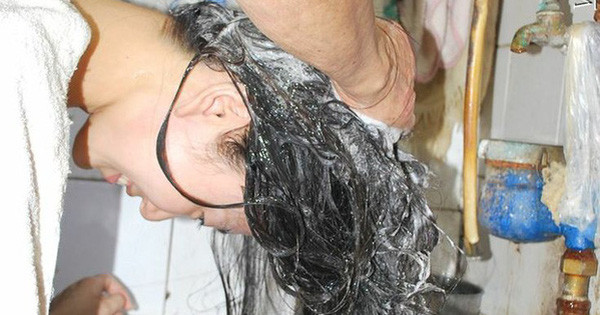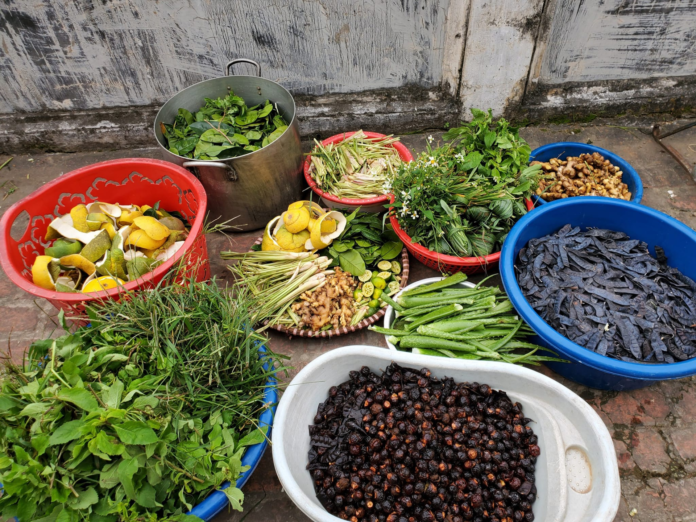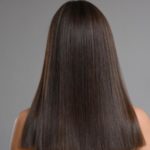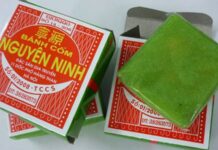Vu Phuong (born 1995, Hung Yen) boasts a thick, smooth, and healthy scalp, free from dandruff and itchiness, thanks to her homemade herbal hair rinse. The recipe includes a variety of herbs and plants found in her garden.
Speaking to VietNamNet, Phuong shared that she used to buy commercially available shampoos. However, after giving birth, she experienced significant hair loss and baldness. People couldn’t help but laugh at the state of her hair. This prompted Phuong to switch to a traditional hair rinse made from herbal ingredients, just like her ancestors used to do.

“After almost two years of using this traditional hair rinse, my hair has become smoother and thicker. Most notably, I no longer experience itchiness or dandruff, especially during the winter,” Phuong said.
Preparing the ingredients and cooking the rinse can be time-consuming, so Phuong decided to make a large batch that would last her an entire month. Her recipe includes the following ingredients: soap nuts, soapberries, pomelo leaves and peel, lemon balm, Mexican marigold, perilla, betel leaf, stinkgrass, salt, ginger root, lime, kumquat, aloe vera, lemongrass, and ginger leaves. “I only need to buy soap nuts and soapberries; the rest can be easily found in my garden or borrowed from neighbors,” Phuong said with a smile.

Once she has gathered all the ingredients, Phuong cleans them and boils them together in a large pot for 8-10 hours. She then strains the liquid, discarding the solids, and reduces the liquid to a thick concentrate. The final product is only one-fifth of the original volume. This concentrate is then stored in bottles and kept in the refrigerator, lasting up to three months.
For each use, depending on the length and volume of hair, 20-50ml of the concentrate is mixed with warm water. The hair is then soaked in the mixture for 10-15 minutes, with gentle massaging and scrubbing. If needed, repeat the process once or twice more until the scalp feels clean. Finally, a few drops of lemon juice can be added to the hair for extra cleansing and smoothness, followed by a warm water rinse.
“I prioritize health, so I make sure all the ingredients I use are clean and extremely mild. I mostly use what’s available in my garden,” Phuong said.
Although Phuong adds more soap nuts and soapberries to create a foamy lather, these bubbles disappear quickly. “Those accustomed to commercial shampoos may find this strange. After one or two washes with this homemade rinse, your hair may feel dry and not as smooth as when using store-bought shampoo and conditioner. But if you persist, you will notice a remarkable difference in your hair’s health. This traditional hair rinse has a pleasant herbal scent, similar to what our ancestors used. It’s a relaxing and beneficial treatment for your hair,” Phuong explained.

After more than a year of using this natural hair rinse herself and sharing it with her loved ones, Phuong has received nothing but positive feedback. As a result, she decided to share her recipe on social media, hoping to help others restore their hair’s natural bounce and shine while also being environmentally friendly.
“I want to share that since completely eliminating chemicals from my hair care routine over a year ago, my hair, as well as that of my family and friends, has become noticeably healthier and thicker. We no longer experience scalp issues like dandruff or hair loss. Our scalps are balanced, and our hair follicles are strong. That’s why I’m sharing my hair care experience, so others can also benefit from this convenient, all-natural hair rinse,” Phuong concluded.

Revealing Natural Hair Care Secrets

Things That Damage Your Hair

8 Hair Care Habits to Break Now to Prevent Hair Loss
Even a small mistake during hair washing can lead to weaker hair that is more prone to falling out.
Photos: NVCC






































